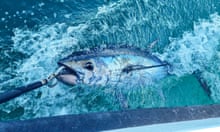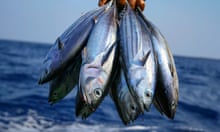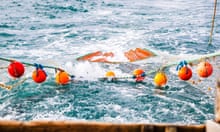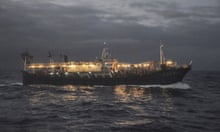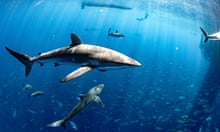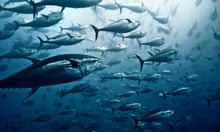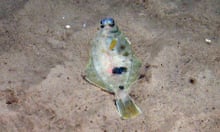Animal campaigners say time is running out for the dolphin population off France’s west coast and are calling on the government to ban fishing in areas where the animals are at risk.
A record number of dead dolphins have washed up on the country’s Atlantic beaches in the last month, but activists believe this is only a fraction of those being injured and killed by fishing boats.
Scientists at the Pelagis sea mammal and bird observatory, attached to the University of La Rochelle, recorded 370 dead dolphins found along the Gulf of Gascony between 1 December and 25 January.
“Without any doubt, being entangled in fishing gear remains the principal cause of death observed in common dolphins found in winter strandings on beaches, and has been since the 1990s,” Pelagis reported.
“This situation is worrying and not specific to France as it affects neighbouring countries.”
The warning came as the marine conservation group Sea Shepherd France published photos showing the body of a dolphin mutilated with a homophobic message that washed up on a French beach at Sables d’Olonne.
“This is the worst face of fishing: no respect for the living, no love for the sea that sustains them. Those who atrociously mutilated this dolphin should never be allowed to fish again,” Sea Shepherd France said.
Last year 669 dolphins were found on French beaches, most from mid-December to early April, during the hake and sea bass fishing season.
Olivier van Canneyt, head of monitoring at Pelagis, said excess dolphin deaths had been “recurrent and very high” since 2016 and had started “especially early” this winter.
Lamya Essemlali, president of Sea Shepherd France, said the number of dolphins washing up on beaches was “the tip of the iceberg” and the toll could be many times higher.
“The large majority of the dolphins captured and freed then drown at sea and their bodies sink,” Essemlali added.
“It is urgent that we close certain zones to fishing boats during certain periods. We keep asking for this, but the fishing lobby is powerful in France and the government has refused. It’s extremely frustrating.
“The only thing we can do is display the dead and mutilated dolphins to local people and to the press and make people realise what is happening.”
Sea Shepherd France, which estimates the true mortality rate of dolphins off the west coast could be as many as 11,000 out of a population of 180,000-200,000, recently launched Operation Dolphin Bycatch for the sixth year running to track and monitor fishing boats in the area. Its team is filming dolphins caught in nets to raise public awareness of the killings.
“Let’s remind the state, which is committed to protecting marine mammals, and the fishers responsible for these massacres, that marine life does not belong to them and that the survival of all of us and that of future generations depends on our ability to preserve it,” Sea Shepherd France said in a statement.
The International Council for the Exploration of the Sea, which coordinates research of the north-east Atlantic marine environment, has also urged the French government to order a suspension of certain non-selective fishing practices – a measure strongly opposed by fishers.
Essemlali added: “Our aim isn’t to stop all fishing, only in certain zones and for a particular period, and for the fishers to receive financial compensation for not fishing in closed zones. That is the urgent solution.
“In the medium term, we need a complete review of fishing methods to ensure they are as selective as possible. The government has a responsibility to protect endangered species. We are not asking them to be nice to dolphins but to respect the law.
“The threat is real and now. The moment we see a signification drop in the dolphin population it will already be too late and scientists tell us they are already seeing signs of this. The situation cannot continue. It is unsustainable and we are running out of time.”


